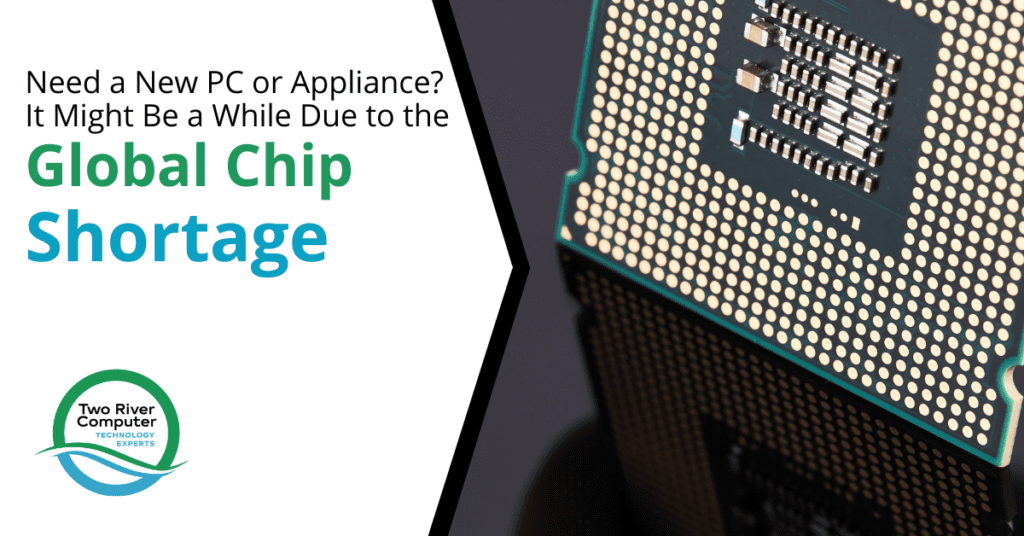
We’ve become a society that’s used to getting products two days from when we press “order” in an online shopping cart. When we need a new computer or Wi-Fi router, we can expect to be booting it up in a matter of hours.
But thanks largely to the pandemic, we don’t always get what we want when we want it anymore and this is especially true when it comes to anything electronic. If you try to pick up a smart coffee maker, new laptop, or the latest video game console, you could be in for a long wait, like months and months!
This is because we are in the middle of a global chip shortage that’s impacting over 169 different industries. It’s led to major shortages and long wait times for computers, Wi-Fi/networking equipment, cars, sound systems, appliances, and other electronic devices of all types.
Ford saw a decrease of 33% in U.S. sales in August due to chip shortages causing inventory delays.
Semiconductor chips are vital to the operations of multiple electronic devices. These chips, which are also called integrated circuits, conduct electricity and hold data and programs in a very small space. These are accessed by the device to create functionality.
The chips are often the “brain” of the device, so although they’re a small component physically, all types of devices cannot operate without them. A shortage in the supply of these chips means that consumers are waiting much longer than they expect for all types of common electronics or anything that uses that “electronic brain,” like a smart washing machine or new car.
Why Is the Chip Shortage Happening?
The major cause of the chip shortage is the pandemic. COVID-19 caused lockdowns across the globe, including in many of the Asian countries that make and test these semiconductor chips.
Factories had to shut down for months, causing a major backlog of chips. And the Delta variant has led to a stuttered recovery, with outbreaks still causing factory slowdowns and closures.
For example, Malaysia is a major hub for semiconductor chip testing and packaging, an important part of the supply chain. According to Bloomberg, that country is still in the midst of the COVID battle, and in June had over 20,000 daily infections reported. This meant delays in lifting lockdowns and in getting chip production back to full capacity.
Because the chips are used in so many different ways, multiple industries are maneuvering to get the low supply that is out there. In mid-2019, before the pandemic, the average wait time for a chip was 11.8 weeks. Now that wait time has nearly doubled to 20.2 weeks. Which further delays the delivery of the final product that the chip is used for to the end consumer.
But even before the pandemic, the rise in popularity of smart devices (voice speakers, wearables, “smart” everything) was leading up to the perfect storm. The chips were already in high demand and demand continued to grow. Then the pandemic hit, and the supply chain was disrupted, leaving factories unable to keep up with demand.
When Will the Chip Shortage End?
When can you expect to get 2-day shipping on a new electronic gadget again?
Experts expect production to get back to its normal capacity sometime around the end of 2021, however, it is dependent upon the pandemic and what that looks like at the end of the year.
But even after chip production gets back to pre-pandemic levels, there is still a huge backlog of semiconductor chip orders that factories need to fill. Filling that backlog is expected to take most of 2022. So, it’s expected to be more than a year before things get back to normal with supply and demand (pending any other unexpected disasters.)
What Does This Mean for Consumers?
Unfortunately, for the foreseeable future, it looks like consumers will have to wait longer for things they’d like to buy that use these types of chips. This could be anything from a new tablet to a new smart sound system. Prices are also likely to be higher due to high demand and low supply.
It’s important to plan ahead for any computer or technology purchase. For example, if you’re building a new home in 6-12 months, then you want to think about the technology components you may need now.
If your company is planning to retire computers and purchase new Windows 11 PCs next year, then you may want to make those purchases now so you can be sure they’ll arrive by the time you actually need them.
Get Expert Help Planning Your Technology Purchases
Having trouble finding the electronics you need? Two River Computer can help you with planning your Fair Haven home or business technology purchases, so you’re out ahead of the game when procuring digital goods.
Contact us today for a free consultation. Call 732-747-0020 or reach us online.


